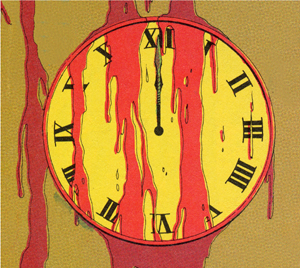I am currently in the process of
enjoying Justin Cronin’s trilogy of The Passage. It is a story that spans over
a 100 years, and it begins with the disintegration of society due to the manufacturing
of a biological weapon gone wrong, which unleashed a virus. The story then
jumps 100 years into the future and the author shows us different societies
that have formed in this post -apocalyptic world: One of them is quite
medieval, not just technology wise, but custom wise. The second one is more
industrializes, ran by a military like group of people. The third society is ran
by a single man known as The Director, whom lives in a wonderful palace, wears
suits and ties, has technology at his fingertips, and his lifestyle is
sustained thanks to the concentration –camp- like facilities he runs. The
Director’s wife pretends that none of this is happening, that there is no
virus, that she is still married to her late husband, and lives in her own delusions
(Blanche Dubois?)
I would love to tell you more about
the plot but I don´t want to spoil the books in case you want to read them, and
also the third and final instalment will not be released until 2015, so I don´t
know how it ends.
I can however, tell you that as I
read, I realized that Cronin must have been inspired by the books we read this
semester (and some we read last semester too).
One of the main characters, Sara, goes
into The Director´s camp. She is taken against her will. She is made to strip,
her head is shaved, she is assigned a number and told she is no longer Sara Fisher.
A metal plate with a number is surgically embedded on her arm, with the number:
“94801. That’s who you are now, the doctor had explained” (Cronin 253).
Within this highly controlled environment,
the undernourished workers have one hope and one hope only. His name is Sergio.
Inside the camp, some prisoners blow themselves up, taking entire buildings
with them. Before they detonate the bomb they always yell one thing “Sergio
lives!”. Later in the novel we find out there is no Sergio. We are told “People need a name. Something to focus on, a
face to attach to the idea. That’s our face. Sergio”(Cronin 277). This
statement reminded me of V for Vendetta:
In Cronin’s novel, any members of the resistance
can be killed and it won’t make a difference, because Sergio can never die,
because he is an invention created to embody an idea. If there is no Sergio,
then Sergio can live forever. Alan Moore´s V can pass on the mask, and in this
way, never die, because just as in Cronin’s novel, the one man is not
important, what is important is the idea he represents, and the hope that the people
will rise and change the tide.
Also within The Director´s camps,
the character Sara Fisher narrates the humiliation one particular Officer of
Human Resources likes to inflict on the prisoners, which seems to be inspired
in George Orwell’s novel 1984. She says “The only thing you could do was take
it, gritting your teeth through the misery of your aching bladder or empty stomach
or exhausted limbs, knowing that soon Whistler’s attention would pass to
another, though this only made things worse and seemed to be the point of the
entire exercise; you found yourself wishing for the suffering to befall somebody
else, and thus you became complicit, part of the system, a cog in a wheel of
torment that never stopped turning.”(Cronin 257)
This resonates with “Do it to Julia!
Do it to Julia! Not me! Julia! I don´t care what you do to her. Tear her face
off, strip her to the bones. Not me! Julia! Not me!” (Orwell 289).
In addition, the people of The
Director’s camps are made to shout “One People! One Homeland! One Director!”
(Cronin 260), and shout it like they mean it every morning before breakfast. In
Orwell’s novel the mantra is “War is peace, freedom is slavery, ignorance is strength”
(Orwell 6). The words are not alike, but in both cases they are drilled into
people´s minds whether they like it or not.
It is natural for writers in this
era (and in most of the eras) to look for inspiration in books from previous
times. Cronin writes of a post -apocalyptic world, and of humans living a
nightmare of their own making, just as Orwell and Moore did, so it is quite likely
he used them for inspiration. And it is good. Contemporary author have the
power to make relevant what has been forgotten, and bring it in a new form to
new generations of readers. Recycling is never bad, it is by definition making
something new out of something old. It is also important to note that
literature is often a reflection of the times, so if Orwell and Moore reacted
in print to their fears of a totalitarian regime, weather it was right or left
wing, then Cronin is reacting to a fear that biological warfare will end us
all, and those that survive will bring hell to earth.
References:
Moore, Alan. V for Vendetta. Gramedia Pustaka Utama, 2006.
Orwell, George. 1984. New York: The New American Library Inc., 1983.
Cronin, Justin. The Twelve (Book Two of The Passage Trilogy): A Novel. penguen, 2012.

















